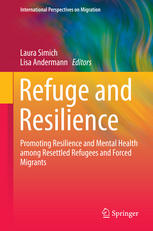

Most ebook files are in PDF format, so you can easily read them using various software such as Foxit Reader or directly on the Google Chrome browser.
Some ebook files are released by publishers in other formats such as .awz, .mobi, .epub, .fb2, etc. You may need to install specific software to read these formats on mobile/PC, such as Calibre.
Please read the tutorial at this link: https://ebookbell.com/faq
We offer FREE conversion to the popular formats you request; however, this may take some time. Therefore, right after payment, please email us, and we will try to provide the service as quickly as possible.
For some exceptional file formats or broken links (if any), please refrain from opening any disputes. Instead, email us first, and we will try to assist within a maximum of 6 hours.
EbookBell Team

4.4
92 reviewsTaking an interdisciplinary approach and focusing on the social and psychological resources that promote resilience among forced migrants, this book presents theory and evidence about what keeps refugees healthy during resettlement. The book draws on contributions from cultural psychiatry, anthropology, ethics, nursing, psychiatric epidemiology, sociology and social work.
Concern about immigrant mental health and social integration in resettlement countries has given rise to public debates that challenge scientists and policy makers to assemble facts and solutions to perceived problems. Since the 1980s, refugee mental health research has been productive but arguably overly-focused on mental disorders and problems rather than solutions. Social science perspectives are not well integrated with medical science and treatment, which is at odds with social reality and underlies inadequacy and fragmentation in policy and service delivery. Research and practice that contribute to positive refugee mental health from Canada and the U.S. show that refugee mental health promotion must take into account social and policy contexts of immigration and health care in addition to medical issues. Despite traumatic experiences, most refugees are not mentally ill in a clinical sense and those who do need medical attention often do not receive appropriate care. As recent studies show, social and cultural determinants of health may play a larger role in refugee health and adaptation outcomes than do biological factors or pre-migration experiences. This book’s goal therefore is to broaden the refugee mental health field with social and cultural perspectives on resilience and mental health.